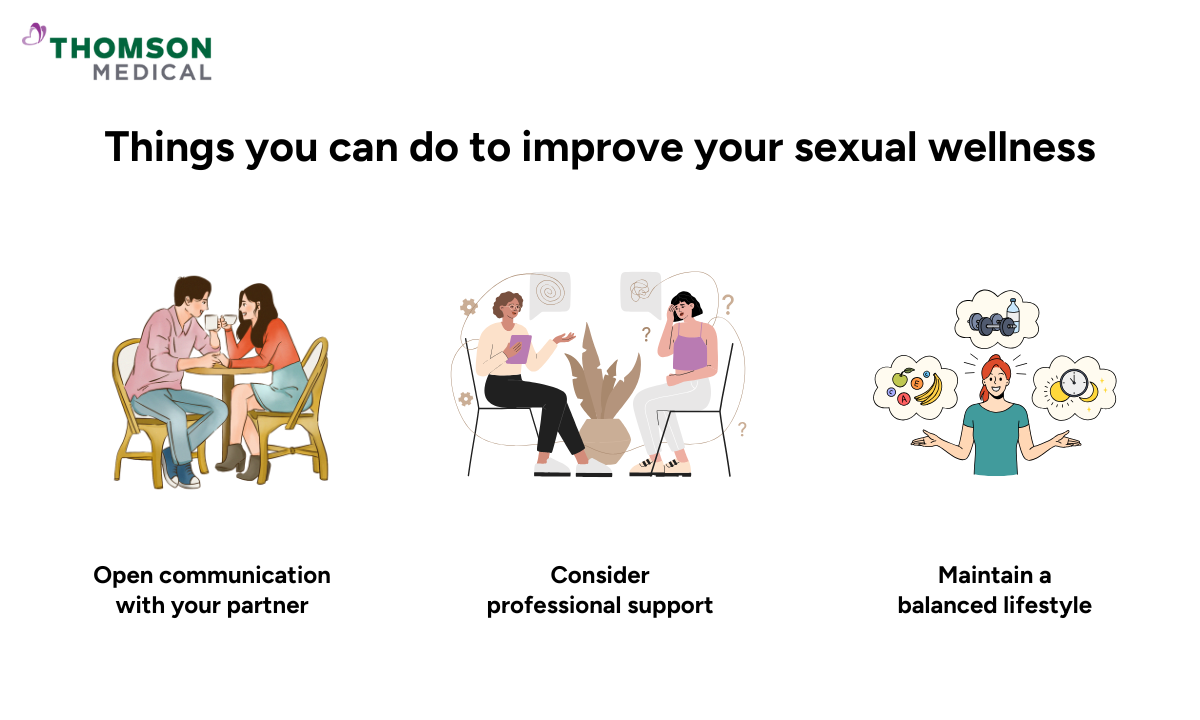Although sexual health is an important part of your overall well-being, it’s still considered a taboo topic by many. However, sexual health isn’t just sexual intercourse, it’s also about understanding your body, staying safe, and knowing when to seek help. That way, you can feel more confident and in control of your sexual wellness.
What is sexual health and why it matters
Sexual health involves physical and mental health, as well as the ability to enjoy safe, consensual, and pleasurable sexual experiences. It’s not only about avoiding sexually transmitted diseases (STIs) or unplanned pregnancies, but also about having a positive and respectful approach to sexuality, relationships, and well-being.
Sexual health also means having access to information, education, and quality healthcare when you need it, and being able to talk openly about it with your partner and healthcare provider. Regardless of your age, relationship status, or stage of life, taking care of your sexual health is always important.
Sexual and reproductive health
Your reproductive health closely links to your sexual well-being. While women and men share the same need for good sexual health, they often experience different challenges due to biological and hormonal factors.
Women’s sexual and reproductive health
Hormonal changes, fertility, and natural life stages such as menstruation or menopause can all influence women’s sexual desire and comfort.
Understanding how your body changes over time helps you take better care of yourself physically, emotionally, and sexually.
Period cycle
A menstrual cycle usually lasts from 21 to 35 days, starting from the first day of one period to the first day of the next. The cycle can be slightly different from person to person.
During your period, you may experience some discomfort. Although this is normal, certain signs may indicate an underlying condition, such as heavy bleeding, severe pain, or irregular periods.
Fertility
Your fertility refers to your ability to conceive. Fertility naturally declines as you get older, with a noticeable change after age 35. During this time, hormone fluctuations can influence your libido, mood, and intimacy with your partner.
Other factors that can affect your fertility include:
STIs:
Infections like chlamydia and gonorrhoea can affect your reproductive health
Lifestyle habits:
Smoking, drinking, and high stress levels can also affect your ability to get pregnant
Overall health conditions:
Polycystic ovarian syndrome (PCOS), endometriosis, or diabetes can impact fertility
Menopause
Menopause is a natural life stage when your body produces fewer reproductive hormones, usually between the ages of 45 and 55. At this stage, you might experience symptoms like hot flashes, vaginal dryness, or mood changes.
If menopause is affecting your intimate life, there are solutions available, such as hormone therapy or lubricants, that can help you feel comfortable again.
Men’s sexual and reproductive health
When it comes to sexual and reproductive health, common issues that men may face include:
Erectile dysfunction (ED)
ED is a condition where you’re having difficulties in achieving or maintaining an erection during sexual activity. It can be caused by stress or medical conditions, such as diabetes, heart disease, or lifestyle habits like smoking or drinking alcohol.
There are many effective treatments available, including medication, therapy, and lifestyle changes. ED can sometimes be an early sign of other health issues, so it’s important to get check-ups regularly.
Prostate health
Prostate enlargement and prostate cancer become more common after age 50. They can cause difficulty starting urination or urinating frequently, especially at night. Regular screening, which typically includes a PSA blood test and a digital rectal exam, is essential for early detection.
Common STIs and their symptoms

Sexually transmitted infections (STIs) are one of the most common health concerns linked to sexual activity.
Many STIs don’t show obvious symptoms, especially in the early stages, so people may not know if they’re carrying them. That’s why regular testing for early detection and treatment is crucial.
Here are some of the most common STIs women may experience:
Chlamydia:
Chlamydia often causes no noticeable symptoms. When symptoms do occur, you may see abnormal discharge, a burning sensation when urinating, or pelvic pain. If left untreated, chlamydia can lead to complications, even infertility.
Gonorrhoea:
If you notice yellow or green discharge, painful urination, and pelvic pain, it could be a sign of gonorrhoea. This infection can affect your genitals, throat, or rectum, depending on the type of sexual contact.
Syphilis:
The early signs of syphilis are usually small, like painless sores on the genitals, anus, or mouth, so they’re easy to miss.
Without treatment, it can later cause rashes, fever, and swollen lymph nodes. Over time, untreated syphilis can damage your organs.
Human Papillomavirus (HPV):
HPV is the most common STI. Some types cause genital warts, while high-risk types can lead to cervical, anal, or throat cancers.
Getting vaccinated can help you prevent this infection effectively.
HIV/AIDS:
HIV is a virus that attacks and weakens your immune system. Without treatment, it’ll progress to AIDS.
Early symptoms of HIV/AIDS may feel like the flu – with fever, fatigue, and swollen lymph nodes. The good news is that with treatment such as antiretroviral therapy (ART), people with HIV can also live a healthy lives.
If you have concerns about possible STI symptoms, schedule an appointment with Thomson Medical for a confidential check-up, test, and personalised medical advice.
Our sexual health specialists
Loading...
Safe sex practices and protection methods
While most STIs are treatable, it’s always better to prevent them in the first place. One of the simplest and most effective ways to do so is by practising safe sex.
Here are some ways to stay safe and protect your sexual health:
Use condoms:
Condoms (both male and female types) are one of the most reliable ways to reduce your risks of STIs and prevent unplanned pregnancy.
Consider dental dams for oral intercourse:
Some STIs like gonorrhoea, herpes, HPV, and syphilis, can be transmitted through oral sex. Using dental dams can keep you safe from infections.
Get vaccinated:
Vaccines, especially HPV and hepatitis B, can protect you from serious infections before you’re exposed.
Open communication:
Talking with your partner about sexual history and testing shows mutual care and respect. There is nothing to feel embarrassed about, it’s just a part of taking care of yourself and your relationship.
Regular sexual health screenings
If you're sexually active, regular check-ups and screenings should be a normal part of your healthcare routine. They help you detect infections early, especially when most STIs show no symptoms. The frequency will depend on your sexual activity, risk factors, and healthcare guidance.
STI testing is straightforward and usually quick. It may include:
Blood test for HIV, syphilis, and hepatitis
Urine test for chlamydia and gonorrhea
Swab test from your genitals, throat, or anus
Your doctor will work with you to find out which tests are the most suitable for you and walk you through the examination to make sure you feel comfortable.
The role of mental health in sexual well-being

Your mental and emotional state plays an important role in your sexual health. Anxiety, depression, stress, or feeling uncomfortable with your body can all impact your desire for intimacy and how you experience it.
There are a few things you can do to improve your sexual wellness:
Open communication with your partner:
Sharing your feelings and needs with your partners helps you feel more connected. It’s also easier to find what’s best for both of you
Consider professional support:
Therapy or counselling can help you work through anxiety, depression, or relationship challenges that affect your intimate life in a safe and judgement-free space
Maintain a balanced lifestyle:
Regular exercise, getting enough sleep, and a healthy diet can also support your sexual wellbeing
When you nurture your mental health, you’re also nurturing your sexual health. A healthy mind is a foundation for satisfying intimacy and genuine connection with your partner.
If you want to take a proactive approach to your sexual health, schedule an appointment with Thomson Medical. Our specialists can help with consultation, personalised treatment, and supportive care in a judgement-free environment.
FAQ
How often should I go for a sexual health check-up if I’m not sexually active?
Even if you are not sexually active, regular check-ups are still important for your overall reproductive health. It’s a good idea to have a routine every 1-3 years. For women, check-ups may include Pap smears and pelvic exams, while for men, it may involve prostate screening.
Can regular exercise and diet improve sexual health?
Yes. Regular exercise and a healthy diet improve blood flow, boost your stamina, support hormone balance, and help you feel more confident in your body.
How soon after exposure can I get tested for sexually transmitted diseases (STDs)?
It depends on what you’re testing for, because different infections take different amounts of time to show up in tests.
Specifically:
- Chlamydia & gonorrhoea, can show up as soon as 1 to 2 weeks after exposure
- While syphilis can show for about 3 to 6 weeks after you get exposed
- For HIV, most accurate results usually comes up after 4 to 6 weeks
If you think you may have been exposed, talk to your doctor to get tested.
Can oral sex transmit sexually transmitted infections (STIs)?
Yes. Infections like gonorrhoea, HPV, herpes and syphilis can spread through oral sex. It’s recommended to use dental dams to reduce the risk.
Can a 70-year-old man still get hard?
Yes. Erections may be less frequent or firm, but many men remain sexually active into their 70s or older. With the right medical support and healthy habits, you can still enjoy a satisfying intimate life.
Why is my stamina lacking in bed?
There are several factors that can affect your stamina, including stress, lack of fitness, poor sleep or health conditions. Healthy habits, a balanced lifestyle, and open communication with a partner or doctor can make a real difference.
The information provided is intended for general guidance only and should not be considered medical advice. For personalised recommendations and tailored advice based on your unique conditions, please consult a specialist at Thomson Medical. Request an appointment with Thomson Medical today.
For more information, contact us:
Thomson Specialists (Women's Health)
Thomson Women's Clinic (TWC)
- Novena:
6592 6686 (Call), 8611 8986 (WA) - Bukit Batok:
6569 0668 (Call), 8686 3525 (WA) - Choa Chu Kang:
6893 1227 (Call), 8282 1796 (WA) Jurong:
6262 8588 (Call), 6262 8588 (WA)- Katong (female doctor):
6970 2272 (Call), 8611 9020 (WA) - Punggol:
6243 6843 (Call), 8811 0328 (WA) - Sembawang: 6753 5228
- Sengkang: 6388 8125
- Serangoon (female doctor): 6382 3313
- Tampines: 6857 6266
- Tiong Bahru: 6276 1525
